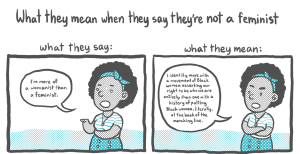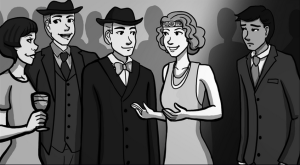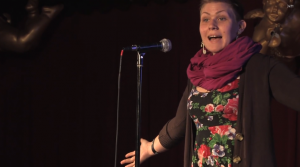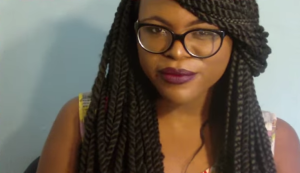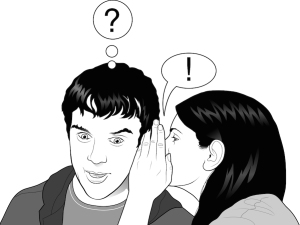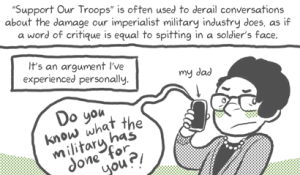Jody Patterson: I am Jody Patterson. I’m a mom of five. We live in Brooklyn. We just moved to Bed-Stuy. We’re just like a regular family. We are always at a crossroad. Can we afford tuition? Do we eat green food, or do we eat fast food? What’s cheaper? This is Othello, this is our rascal. This is Cassius, my oldest. I like to call him the President. That’s Penelope. (laughs) That’s Penelope. He’s seven.
Penelope: I’m eight!
Jody: Penel is my third child, and we assumed girl, perfectly, anatomically, perfect girl. Everything looked in order. Really early on, there were signs that Penel was very different. Something was weighing on Penelope really, really heavy. Every time we would try to put clothing on him or dress him or bathe him, there was an intense reaction to his body from himself.
Once Penelope started to speak, it was like, “I’m not a baby.” That was the first sentences, “I’m not baby,” and “No.” It was no to clothing, no to shoes, no to hair brushing. One day, I remember pulling Penelope aside and just being like “What’s really wrong, baby? Why are you so upset?” Penelope said, “Because everyone thinks I’m a girl.” I said, “Oh, baby, it’s fine. However you feel on the inside is great,” and he said “No, I don’t feel like a boy, Momma. I am a boy.” That sentence was really hard because you don’t—I was ill-equipped. What do I do with that? I don’t know how to handle that. I felt like I had dropped the ball in some area.
All of my sisters and my mom raised me to really be proud of being a woman, and my child was like, “I don’t want to be a woman. I’m not a woman. I don’t want to be a woman. I love you, Mom, but I don’t want to look like you. I want to look like Dad.” So I just felt like, “What had I done? Had I forgotten to do something that was really essential to self-pride?”
Othello: That’s my sister. That’s me when I was three or two, when I was shy. That’s me. That’s Cassius. That’s Penelope.
Jody: A lot of people confuse this conversation that I had with Penelope as being something too advanced for a two-year-old to talk about, but identity is something that happens that early. I think when people say “How does Penelope know that he’s a boy at age two,” and I would say “When did you realize you were a woman?” It was crystal clear what he was saying, “I don’t want to be you, Momma. I want to be Poppa. I want a doctor to make me a peanut. I don’t want boobs.” I do remember at that moment in my head not considering Penelope a she anymore. I was really aware of that what Penelope was talking about was identity, but in terms of me, why did I let my kid lead in this moment? Because it smacked me in the face.
Jody: Close your eyes. This is going to be fingers with blood. Don’t say—fingers with blooood, lots of blooood.
Cassius: It’s actual blood, Penel. Mom, don’t do that. Don’t use actual blood.
Othello: Ketchup!
Penelope: I don’t like ketchup stuff!
Jody: Fingers with blooood.
Penelope: Chicken.
(Everyone laughs)
Speaker 1: After we said, “Okay, yes you’re a boy and it’s all good,” and “Yes, you can wear really, like, boy clothing, not like tom-boy clothing but just go to the boy section. Find anything that you want to wear and wear it,” he just kind of lit up. Initially, it was weird. You notice all the constructs around gender, and in the same way, you become very keen on the way you treat girls and the way you treat boys. I like the fact that the kids sometimes talk about it and debate it or don’t see eye to eye. If Penelope can handle that conversation in our house, then, he’s ready for handling it in the world.
His siblings and his friends protect him. If we’re walking into a new situation, a lot of the times his best friends will step ahead and be like “Okay, my friend Penelope is coming. He is a boy. He likes to be seen as a boy. You can call him Penel. You can call him Penelope. You can call him Jack, but he’s going to come in and he’s a boy.” There’s this camaraderie that his siblings have with him and his friends have that they look out for him.
Cassius: We’re playing challenges in the treehouse.
Jody: I’m kind of sick in my stomach when I start thinking about puberty. It’s all of the rights of passages of a woman, with trans kids those are the worst things to have. A transboy gets his period, sometimes it can be super depressing. Penel’s body is not everything. It’s a part of him, but it’s not the whole story.
When I think of puberty, when people start to really focus on how Penelope is looking, it makes me nervous because in our minds, girls look this way and boys look that way. It’s going to be harder for people to understand that Penelope is a boy. There’s not a lot of research around things that transgender people do medically to alter their bodies. There’s not a ton of research around it. That makes me nervous.
I don’t really like—I’m super organic, and our food is super clean, and then, the idea of taking hormones and injecting chemicals daily is frightening. Really, Penelope is a boy without changes. He doesn’t have to change. He doesn’t have to take hormones or puberty blockers or change his body, have surgery. If he chooses to, he might, but he doesn’t have to. He’s a boy regardless.
Penelope: It’s a blueasaurus!
Jody: We don’t know his official name?
Jody: A lot of the things I thought I would never be able to handle, you get it together really quickly when it’s your kid. I think about the future and I try to think that everything is good, that I live in New York City, that this is 2015, and I think people’s minds are changing. I think the collective understanding is that we are who we are from the inside out, and that is the direction we’re moving in.
We’re really caring more about individuals than we do about big corporations. I love this. This makes me feel really optimistic about the future. Two lessons that I’ve learned from my transgender child are, first one, winners are losers that got back up. That’s the biggest thing. You just have to keep getting back up. Everyone who’s ever succeeded, anyone that’s fantastically amazingly successful has had loser moments. The best have gone through the worst. We have to keep getting back up.
I think the other one is accept happiness in any form. Who am I to say how happiness looks or how happiness feels? Let’s, on a simple level, allow for happiness in all forms.






